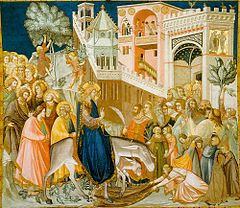
“He
answered, ‘I tell you, if these were silent, the stones would shout out.’” (Luke
19:40)
Well
it looks like somebody got baptized here in Philly. Yup. On Opening Day of the
Phillies baseball season at Citizens Bank Park, right fielder Bryce Harper—the slugger
we’re counting on to lead us to the World Series, the dude we’re paying 330 million dollars to have on our
roster—wiffled twice at bat and was greeted by a chorus of boos from
disappointed fans.
But,
hey! He surely must’ve expected that if knew anything at all about Philadelphia
sports fans. We’re willing to greet his arrival as triumphant with loud “Hosannas”
when he signs with our club, BUT: if he racks up two big, ugly K’s in his first
two times at bat, we’re going to boo his ass.
Harper’s
Opening Day odyssey is kind of symbolic of the meaning of Palm Sunday, don’t
you think? Here’s Jesus arriving in town with much fanfare by his followers.
They’re praising God for all of his past deeds of power. There is, however, a
big, black, nasty raincloud hanging over this little parade. We know the rest
of the story. We know that all the cheers and praises are going to fall silent
when this guy doesn’t turn out to be the person the crowd wants him to be.
Palm
Sunday, for all of its festiveness, is a reminder of how fickle we are as
people, how short-sighted, and hung-up we are on instant gratification. It
doesn’t take even a week for the most devoted of disciples to scatter and deny
they even know Jesus.
This
year we look at the story as it appears in Luke’s Gospel (Luke 19:28-40). Do
you notice something missing here? Of the four Gospels, Luke’s Palm Sunday
story is without palms. It’s been suggested by smart, Bible scholar folks[i] that the palms were used
to welcome political or military heroes. Waving the palms for Jesus would
suggest that he was coming to take political power, so Luke—who is always
trying to make Jesus as palatable to the Romans as possible—omits this detail
from his account. Since the other Gospels
do mention the palm, I tend to think palms got waved. Luke just didn’t want
to rock any boats by mentioning them.
What
Luke does mention is the reaction of the Pharisees to the praises being sung by
Jesus’ followers. This type of joy and praise is just unseemly to these guys.
Maybe they don’t like to upset anything. Maybe they’re comfortable with how
things are. If so, that’s a real shame, because the way things are isn’t too
great. In five more verses Jesus will enter the Temple of Jerusalem and call out
the chief priests for their sacrificial animal-selling scam. Jesus clearly
refers to the temple as “a den of robbers,” (v.46), so you know somebody was
getting ripped-off.
If
you think about it, that was a pretty daring thing to do, and doubtless led to
Jesus’ death on the cross. But it had to be said. Somebody had to speak the
truth. In the Kingdom of God, there is no pretending. The dirty little secrets
will come out, be repented, and be forgiven, or they will eat through us like
acid. God’s truth will out.
If
our churches aren’t speaking for justice, mercy, and peace, someone else will
do it. If you aren’t saying what needs to be said, someone else will. If we all
stay silent, the truth will still be the truth and it will come out some way, somehow.
The Pharisees didn’t want to hear about a messiah of acceptance, inclusion, forgiveness,
and love. But if Jesus’ disciples were silent, the very stones would cry out
his name.
Have
you had a chance to witness to your faith? Don’t be silent. Let it out.
No comments:
Post a Comment